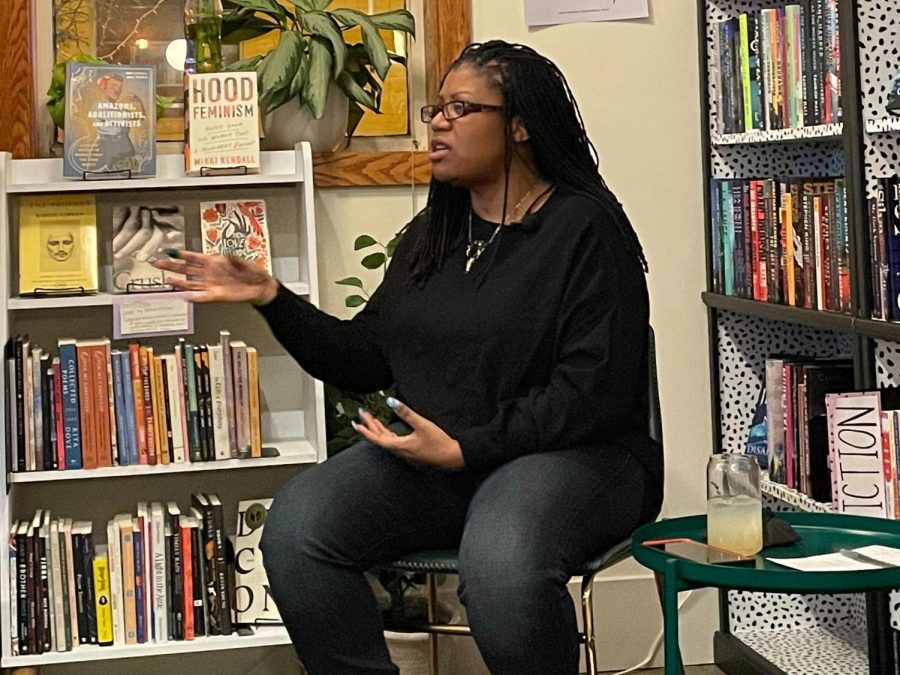University alum, bestselling author Mikki Kendall discusses ‘Hood Feminism’ at The Literary
University alumnae, Mikki Kendall talks about her book, “Hood Feminism” at The Literary on Jan. 20. The New York Times Bestseller is a nonfiction novel discussing modern feminism.
Jan 24, 2022
The door tings once more, and a rush of cold breeze fills the warm bookstore. Sparkling yellow lights brighten the quiet bustling of chatter and the clinking of wine glasses.
On Jan. 20, a collective audience of readers, listeners and curious visitors gathered at The Literary in Champaign to hear from University alum Mikki Kendall. Kendall is an activist and the author of the New York Times bestseller: “Hood Feminism,” a nonfiction critique of mainstream feminism.
During Kendall’s visit to The Literary, she not only spoke about her book but also inspired those around with her honest humor and down-to-earth sarcasm.
“You are going to see a lot of people pushing the idea to young men and women that ‘a return to traditional values’ will somehow save them,” Kendall said. “The ’50s never looked the way you did, and you have every right to want more for your future than what someone else thinks you should have. So don’t ever feel ashamed of saying ‘no’ to the push for you to do what grandma and grandpa tells you they did.”
McCarrick Fitzgerald, senior in LAS, was one of the young women in attendance. Fitzgerald spoke about her experience meeting Kendall.
Get The Daily Illini in your inbox!
“Mikki Kendall in person is represented very well in her writing, very down to earth and conversational,” Fitzgerald said. “She is refreshingly frank and was so kind when I got to speak with her while she signed my copy of ‘Hood Feminism.'”
Julia Aguilar, senior in ACES, appreciated Kendalls’ inclusive dialogue about feminism.
“I think modern-day feminism has often erased the issues that women of color and more often Black women are erased from that dialogue,” Aguilar said. “I think I definitely appreciate how she aimed to make her book as accessible to people both in the dialogue she’s used but also how this event made it available for individuals like myself who did not know much about it before.”
Kendall also urged the audience to consider how the University could become more accessible for different people.
“Nontraditional students, students who don’t have very much money, students who may just need more support; the University (should) provide that support so that more women, more feminists can come from that University,” Kendall said.
Emily Fey, senior in AHS, read Kendall’s book over the summer. Fey agreed such conversations are important to have.
“I really liked how she talked about her journey of writing the book and how she also tied in topics and issues that she addressed in the book,” she said.
Fey also appreciated Kendall’s approach to the uneasiness of feminism. Topics surrounding feminism as a movement can be perceived as being vague and generally overwhelming for people of all genders.
“I also appreciate how she gave general life advice along with how to be a part of a movement without making it your top priority in life,” Fey said.
Kendall broadened the feminist “agenda” into a conversation for everyone and asked men to be part of the solution.
“I feel like men can come in is as allies and accomplices, but that’s a direct choice,” she said. “Men really have to, both, not be a problem, but also speak up to other men who are a problem. Because sometimes I feel like it’s really easy to say ‘Well women should fix that. Women should do this; women should do that.’ Feminism is supposed to fix all these things.”
She added that some people, however, will not change.
“But feminism, talking to misogynists, doesn’t really work that great,” Kendall said. “Sometimes misogynists won’t hear the same things we’ll say until a man says it.”
Fitzgerald said the lack of academic jargon in Kendall’s speech allowed more people to engage with the topic.
“During the talk she said ‘You can write to impress people or you can write to be understood by people’ and that resonated with me because my time at UIUC has made me aware of how academic language is used to make learning (and) participating in discourse inaccessible,” Fitzgerald said. “Her book was written to make discourse on feminist frameworks expand beyond the academic institutional community. That’s something I really appreciate.”
In her last remarks, Kendall alluded to the pandemic and how it marked the beginning of her book’s journey. She also looked toward the future.
“I think we need a plan, not only for during the pandemic, but after,” Kendall said.
Kendall’s biggest piece of advice to her audience was to dream big.
“Progress looks a lot like someone not just having an idea but following it through; even when people think that they can’t,” she said.






